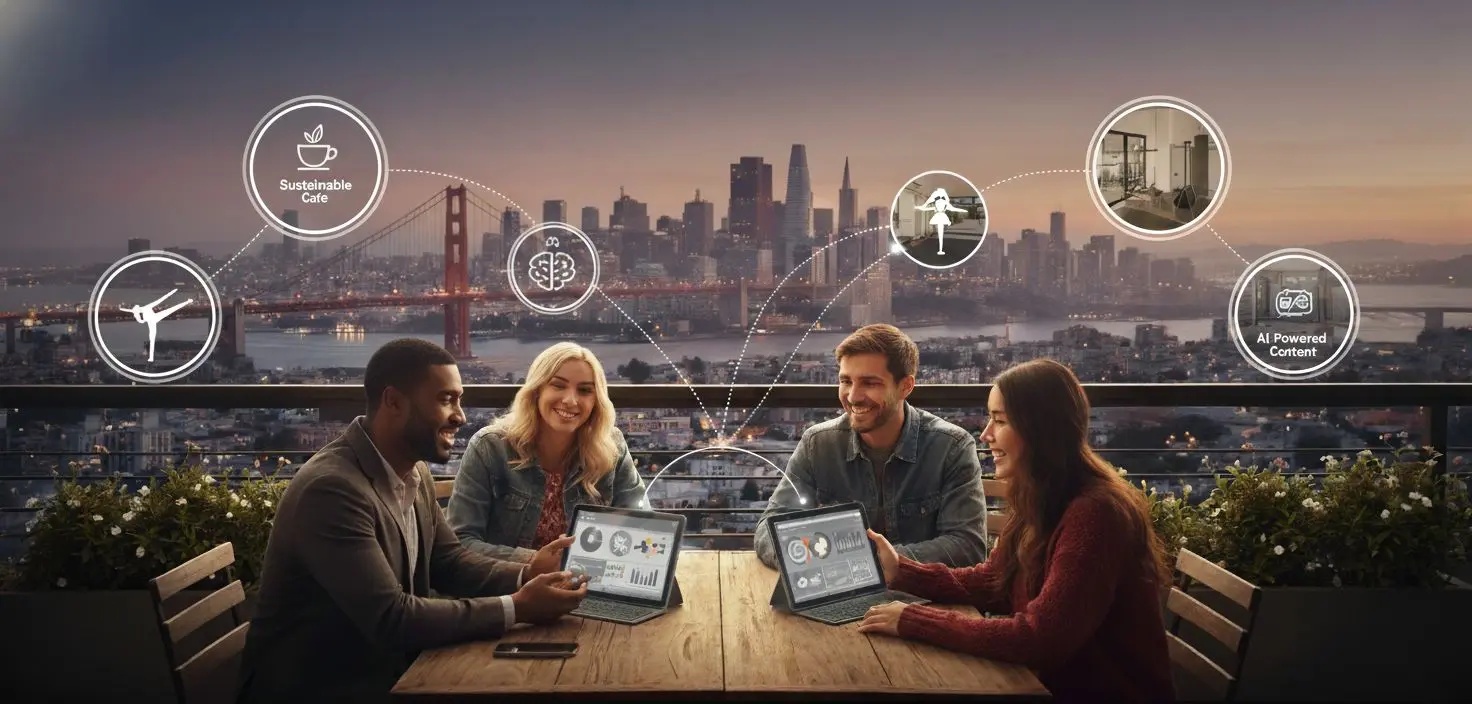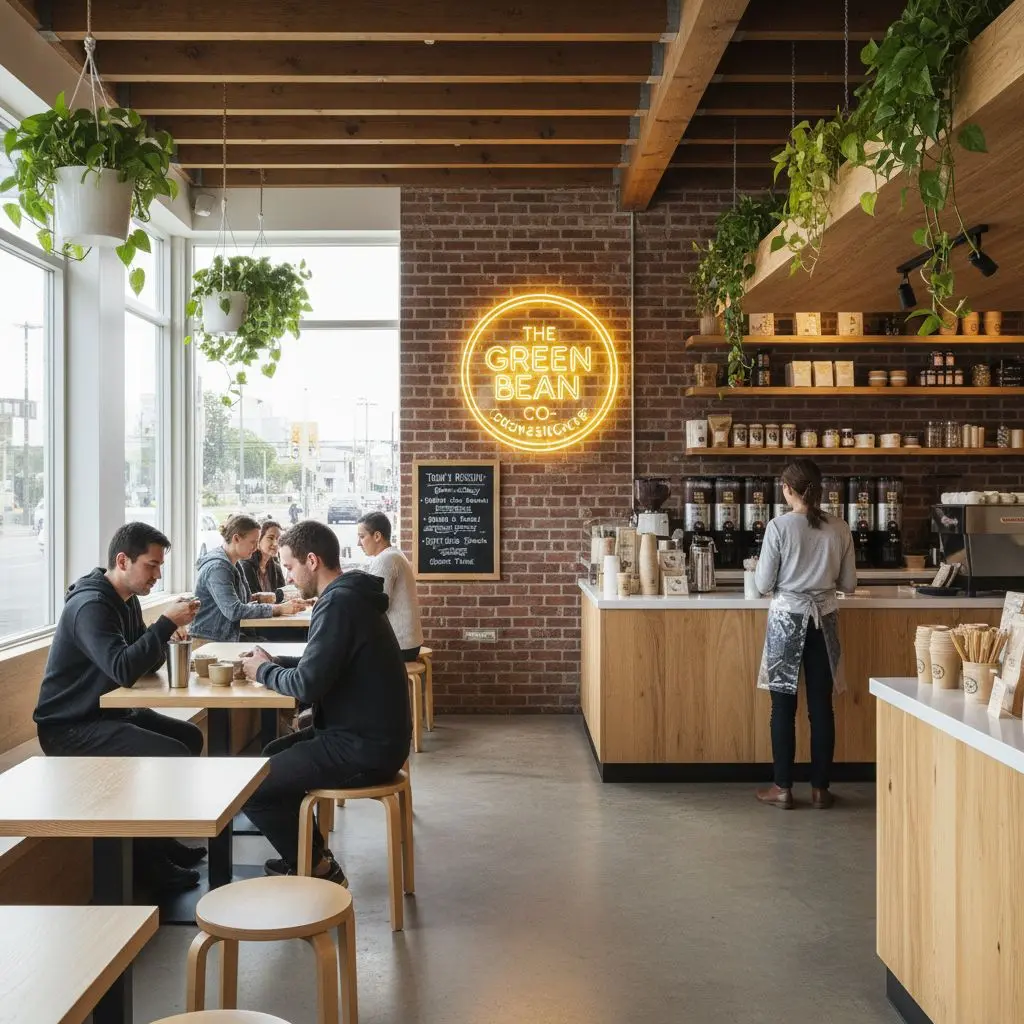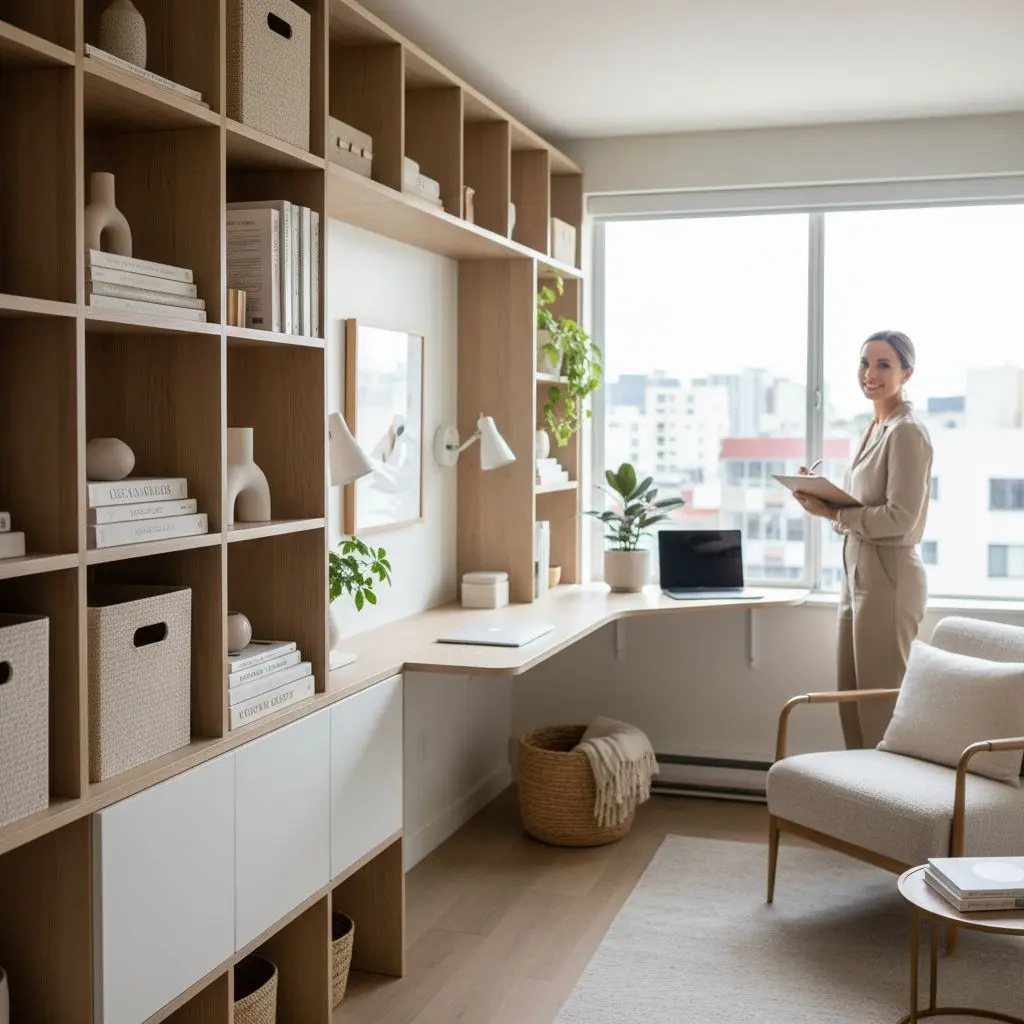10 Promising Small Business Ideas to Start in San Francisco in 2025


Table of Content
San Francisco isn’t just a city — it’s a mindset. It’s where ideas meet innovation, where neighborhoods feel like living think tanks, and where a café conversation can spark the next cultural shift or startup wave.
If you’re exploring small business ideas to start in San Francisco, you’re stepping into one of the most dynamic and forward-thinking markets in the world — one that celebrates sustainability, design, tech-driven solutions, and authentic, local experiences.
But before diving into ideas, let’s understand why San Francisco remains one of the most influential launchpads for small businesses in 2025.
Why Start a Business in San Francisco?
Let’s start with the numbers. The San Francisco Bay Area has a GDP exceeding $1.2 trillion, ranking as one of the top five metropolitan economies in the United States. Despite challenges like high rent and regulation, San Francisco consistently ranks as one of the best cities for innovation, venture activity, and startup formation.
The U.S. Census Bureau estimates that over 98% of Bay Area businesses are small businesses, and they employ nearly half the local workforce.
Moreover, the population here has an unusually high median household income — $136,689 (2025 est.), nearly double the U.S. median — and a deeply ingrained culture of supporting local, artisanal, and mission-driven brands.
San Francisco rewards innovation with authenticity. It’s a city that values not just what you sell, but why you’re doing it.
1. Sustainable Café or Zero-Waste Coffee Bar ☕🌿

Café culture in San Francisco is deeply intertwined with sustainability and design. A successful café here isn’t just about caffeine — it’s about conscience.
According to the National Coffee Association, over 66% of U.S. adults drink coffee daily, and in San Francisco, specialty cafés dominate — from zero-waste roasters to oat-milk-only bars.
The opportunity lies in eco-driven differentiation. Imagine:
- Compostable packaging and reusable cup programs
- Transparent sourcing and carbon-offset partnerships
- Plant-forward menus with local roasters like Ritual or Sightglass
The average café in SF can generate $250,000–$500,000 annually, with strong neighborhood loyalty if your brand feels ethical, aesthetic, and community-rooted.
Pro Tip: Build a digital-first loyalty program integrated into your POS — it keeps your eco-conscious audience coming back for both your coffee and your cause.
2. Boutique Fitness or Mindfulness Studio 🧘
In a city where wellness meets tech, boutique studios thrive by blending performance with mindfulness.
The global boutique fitness market, valued at $49 billion in 2024, is expected to double by 2034. But in San Francisco, the focus has shifted — from sweat to self-awareness.
Think sound baths, breathwork collectives, and pilates for the “remote worker’s posture.” Minimalist studios in neighborhoods like Mission, Hayes Valley, and Noe Valley are already seeing waiting lists for niche experiences.
Curate your own vibe — candle-lit sessions, themed playlists, aromatherapy-infused rooms — and you’ll build a community that pays for connection as much as movement.
3. Tech Repair & Device Care Lounge 💻🔧
San Francisco has more devices per person than any U.S. metro area, and that dependence creates a huge opportunity.
A mobile and gadget repair lounge — designed like an Apple Store meets café — can attract freelancers, startup workers, and students who want fast, trustworthy service.
The global device repair market crossed $142.6 billion in 2024, driven by sustainability awareness and the right-to-repair movement. With people upgrading slower and keeping devices longer, local tech repair shops can easily earn profit margins over 40%.
Offer pickup-and-drop options, same-day repair, or eco-packaging, and position your business as the sustainable alternative to replacement.
4. Specialty Home Café & Remote Work Lounge ☕💻
With one of the highest hybrid-work rates in the U.S. — 36% of San Franciscans work remotely at least three days a week (U.S. Census Bureau 2024) — professionals here crave calm, inspiring spaces to focus and connect.
A specialty home café or work lounge can meet that demand. Think premium coffee, healthy bites, ergonomic seating, fast Wi-Fi, and quiet meeting pods — without the corporate coworking vibe.
The U.S. “co-working café” segment is projected to surpass $7.1 billion by 2030, driven by freelancers and creative teams seeking flexible, design-first workspaces.
Neighborhoods like Hayes Valley, Mission, and Inner Richmond are perfect for these hybrid cafés that blend community, aesthetics, and productivity.
You’re not just selling coffee; you’re selling clarity.
5. AI-Powered Content & Design Studio 🎥🧠
In the city that gave the world OpenAI, creative entrepreneurs are blending tech and storytelling like never before.
The global creator economy, now worth over $250 billion, depends on fast-turnaround content — and creators, agencies, and small businesses all need help producing it.
Offer AI-assisted video editing, prompt engineering, social video scripting, or short-form ad production. Your customers?
- Tech founders building product explainers
- Local fashion and wellness brands needing content calendars
- Startups that can’t afford full creative teams
Even a small studio with 2–3 editors and good equipment can pull in $150K–$300K/year, especially if paired with smart automation and retainer-based pricing.
6. Pet Grooming & Daycare Boutique 🐾
With over 250,000 pet-owning households in San Francisco and a culture that treats pets like children, this is one of the most recession-proof ideas on the list.
Pet owning households spent $27.8 billion on pet care in 2024, with grooming, boarding, and dog-walking leading the category.
A cozy, well-branded grooming studio with natural products, live camera access for owners, and organic treats can stand out easily. Add emotional touchpoints like “paw-scriptions” (personalized grooming plans) and loyalty memberships to deepen trust.
7. Vintage & Circular Fashion Boutique 👗♻️
San Francisco’s sustainability culture meets its love for individuality here.
The secondhand apparel market in the U.S. is expected to hit $73 billion by 2028, with Gen Z and millennials leading the charge. Hayes Valley, Haight-Ashbury, and Mission are vintage hotspots already, but there’s still room for unique angles — think curated capsule wardrobes, genderless fashion, or local-designer collaborations.
Pair every sale with storytelling — origins of the garment, craftsmanship details, sustainability metrics — and turn your store into an experience.
8. Specialty Bakery or Artisanal Dessert Lab 🍰
San Francisco’s bakery scene is equal parts tradition and experimentation — from sourdough to mochi donuts.
The artisan bakery market in the U.S. is projected to grow at CAGR 5.3% through 2030, driven by rising demand for premium and cultural fusion products.
Your niche might be gluten-free croissants, plant-based cakes, or Filipino ensaymadas. Locations near dense foot traffic (like the Mission or the Richmond District) are ideal.
Packaging and presentation matter almost as much as flavor. Think photogenic, shareable, and soulful.
9. Micro-Event & Dinner Experience Design 🍷✨
People in SF don’t just go out to eat — they go out to feel something.
Host curated dinner parties, wine-pairing nights, or chef’s-table pop-ups. Data from the National Restaurant Association shows that consumers under 40 increasingly spend on “experience-based dining” — meaning your brand can thrive by combining storytelling, food, and ambiance.
You don’t need a full restaurant to start. Use loft spaces, rooftops, or private homes — and leverage ticketing platforms to build exclusivity.
Each dinner should feel like a memory designed with taste, sound, and scent.
10. Home Organization & Design Consultancy 🏠🧺

San Francisco real estate is famously tight. With housing prices over 100% higher than the national average, every inch of space counts.
This makes home organization a necessity, not a luxury. From modular storage for compact apartments to aesthetic home offices for remote workers, organization and spatial design services are booming.
Offer consultations, decluttering packages, and before-after photo storytelling for social media — and you’ll tap into a clientele that values both calm and aesthetics.
Ready to Bring Your Small Business Idea to Life?
Every successful San Francisco business starts with an idea — but it thrives on execution. Whether you’re building a sustainable café, an AI-powered content studio, or a micro-event brand, you’ll need a strong operational backbone to scale efficiently.
A powerful POS system helps you:
- Bill customers instantly across channels
- Track your real-time sales and performance
- Manage inventory and suppliers efficiently
- Offer loyalty and membership programs
- Access actionable customer insights
This is where your operational foundation matters — the invisible system that keeps creativity profitable.
And that’s where OneHubPOS comes in — helping San Francisco entrepreneurs run smarter. From cafes and retail shops to bakeries and service studios, OneHubPOS simplifies billing, staff management, and analytics — all from one clean dashboard.
Want to see OneHubPOS in action?
👉 Book a free 30-minute demo and discover how to power your SF business with speed, clarity, and data.
Frequently Asked Questions

San Francisco rewards businesses that mix creativity with social or environmental purpose. Cafés, wellness studios, sustainable fashion, tech repair, and pet care boutiques perform exceptionally well.

Startup costs vary widely — from $10K–$30K for mobile or pop-up concepts to $75K–$250K for cafés, bakeries, or fitness studios. Renting or leasing in SF is expensive, so shared or temporary spaces (like food trucks or co-retail) are great first steps.

Yes. You must register with the San Francisco Office of the Treasurer & Tax Collector for a Business Registration Certificate. Depending on your business type, additional health, zoning, or seller’s permits may apply.

- Mission District: Artsy, food-forward, and diverse
- Hayes Valley: Design-savvy and upscale
- SoMa: Startup energy and tech crowd
- North Beach: Classic charm, ideal for dining and cafés
- Noe Valley: Family-oriented and boutique-friendly

Absolutely — especially for founders who embrace innovation, storytelling, and sustainability. While costs are higher, the customer base here values quality, ethics, and individuality — giving niche ideas a real chance to flourish.

